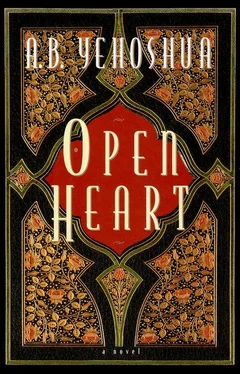A. Yehoshua - Open Heart
Здесь есть возможность читать онлайн «A. Yehoshua - Open Heart» весь текст электронной книги совершенно бесплатно (целиком полную версию без сокращений). В некоторых случаях можно слушать аудио, скачать через торрент в формате fb2 и присутствует краткое содержание. Год выпуска: 2014, Издательство: Peter Halban, Жанр: Современная проза, на английском языке. Описание произведения, (предисловие) а так же отзывы посетителей доступны на портале библиотеки ЛибКат.
- Название:Open Heart
- Автор:
- Издательство:Peter Halban
- Жанр:
- Год:2014
- ISBN:нет данных
- Рейтинг книги:3 / 5. Голосов: 1
-
Избранное:Добавить в избранное
- Отзывы:
-
Ваша оценка:
- 60
- 1
- 2
- 3
- 4
- 5
Open Heart: краткое содержание, описание и аннотация
Предлагаем к чтению аннотацию, описание, краткое содержание или предисловие (зависит от того, что написал сам автор книги «Open Heart»). Если вы не нашли необходимую информацию о книге — напишите в комментариях, мы постараемся отыскать её.
Open Heart — читать онлайн бесплатно полную книгу (весь текст) целиком
Ниже представлен текст книги, разбитый по страницам. Система сохранения места последней прочитанной страницы, позволяет с удобством читать онлайн бесплатно книгу «Open Heart», без необходимости каждый раз заново искать на чём Вы остановились. Поставьте закладку, и сможете в любой момент перейти на страницу, на которой закончили чтение.
Интервал:
Закладка:
He took me to Gaya by strange shortcuts, dirt roads winding through fields and orchards, and if there were any houses or shacks in the vast, flat plain, I was unaware of them, for their lights were buried deep inside them. Since the sky was shrouded in a dense gray mist and there wasn’t a moon or a single star to be seen, the only sign of life was the white turban floating before me. Nevertheless, I felt quiet and confident as I held tightly to the edges of the swaying seat, the knapsack at my feet, and I was no longer troubled by attempts to decipher the Indian reality. My mind was now occupied by a practical medical reality, at the center of which was the need to diagnose correctly the condition of the sick woman I had left behind, whom I could still see in my imagination, lying in her little room with her parents — who, I now, in the darkness of the night, sensed were afraid of her — tiptoeing around her bed. When the rickshaw began to slow down, I strapped the knapsack onto my back and checked to see that the pouch was snugly fastened to my belt, and the moment we stopped outside the hospital, which I recognized even in the dense darkness, I jumped down and said to the turbaned Indian, “Don’t move from here.” I ran eagerly up the steps: it had been more than a week since I had been in a hospital, and I missed even the smell.
But the smell that greeted me here was utterly different from the familiar one of Lysol and feces, or of drugs and ether, sometimes mingled with the smell of boiled vegetables. And it wasn’t the smell of the dead either, with which I was also familiar, but simply the smell of rot that violently assailed me. I stopped in the doorway, took a large gauze pad out of the knapsack, sprinkled it with iodine, and tied it onto my face with a bandage, like a surgical mask, and then I was able to enter the corridors to look for the laboratory. It was possibly thanks to this orange bandage on my face and not to the fact that I announced myself to be a doctor that someone paid attention to me and led me to the laboratory, which was situated in a courtyard at the back of the hospital, in a big, old hut besieged by silent patients, mainly women squatting on the bare ground with ragged children by their side. There nobody was impressed by my orange-stained mask, and I had to push my way to the head of the line and force my way into the hut, toward a very dark-skinned but noble-looking middle-aged woman, tall and thin as a slab of black marble, dressed in a flimsy rainbow-colored sari, with a big red third eye painted between her eyes. She was the lab supervisor, perhaps a clerk or perhaps a technician, slow in her movements and apparently also very disorganized, because her desk was untidily heaped with dozens of cards and lab results in different colors, among which she rummaged for the test numbers in order to give the results to the people crowding around her. At first she persisted in ignoring me, even though I had already removed the mask and explained that I was a doctor, but at last she turned to me and asked me what I wanted, and when I told her and added that I was prepared to pay double if the tests were done at once, she looked down at me from her towering height and said with a faintly contemptuous expression that a hospital belonging to Buddha, who was also the god of beggars, did not take payment, but if I wanted to make a donation there was a box for this purpose at the main entrance. “Certainly, I’ll make a donation at once,” I promised, and hurried to take the test tubes and containers out of the pouch. At first she recoiled. “Not here,” she said, waving me away, “not here, there’s a special counter. Go and stand in the line.” But finally she gave in and told me to write down which tests I wanted on some hospital notepaper. I wrote it all down, and added a request for liver-function tests; I signed my name and gave the number of my Israeli medical license, and needless to say, I avoided mentioning the fact that until a few days before my patient had been hospitalized in this very hospital, in order not to give rise to any unexpected bureaucratic complications. She glanced at my list, put a big red question mark next to “liver-function tests,” said that she was not sure if they could do them here, casually wrapped the blood and urine samples in the notepaper — without even bothering to secure it with tape or rubber rings — and threw them into a big cardboard box full of dusty test tubes, some empty and others full of strange-colored fluids. I thanked her, but repeated my request to have the tests done as quickly as possible; if necessary, I said, I was willing to step into the laboratory myself and help. “My patient,” I said, “is burning with fever in Bodhgaya, and as soon as we know the results we can begin to treat her.” But then the noble Indian woman suddenly flared up. “Everyone here wants to know, everyone here is waiting, everyone here is sick, everyone was sent by a doctor, nobody comes to have blood tests for fun,” she scolded me angrily, as if I were a boy. Why did I think I was entitled to an answer without waiting my turn? Was it only because the people standing here had darker skins than mine? And with a long, slender hand she waved me contemptuously away.
Without understanding why I felt so deeply insulted by this woman, I had a momentary impulse to ask her to return the samples so that I could take them somewhere more reliable. But I kept quiet. Feeling both mortified and at a loss, because I didn’t know where else to go, nor when to come back for the results, I left the laboratory hut. For some time I hung around in the courtyard, pacing to and fro among the Indians waiting in the dark, peeping through the window at the tired lab technicians sitting crowded together in the dim light, big bottles of serum at their sides, peering through ancient microscopes at the blood and urine samples that had been brought there in little blue glass jars. In the end I got fed up with this aimless hanging around and returned to the place where I had left my rickshaw, but it was now surrounded by many similar vehicles and I couldn’t recognize it. I had to go from one rickshaw to the next and examine the sleepy drivers curled up on their backseats before I found my driver, who, luckily for me, had kept his regal white turban on in his sleep. “Take me to the river,” I instructed him, for from the day I had arrived in India I had found myself drawn to rivers. But the sleepy driver smiled at me with his gaping, ancient, toothless mouth and tried to explain that there was no river in Gaya now. “There’s no river now?” I said in bewilderment. “But there’s a river on the map in the guidebook.” There was a river but there was no water in it, he tried to say, helping me in the meantime onto the seat, still warm from his sleep, covering me with a tattered blanket, and pulling his rickshaw silently out of the heap of rickshaws surrounding it. He drove me to the bank of the river, which was indeed there, where the guidebook said it was, but almost entirely dry, even in this winter season. In the depths of the dry riverbed a fire was burning, and by its shape I guessed it was a funeral pyre. The figures squatting around it in such celestial serenity were presumably the relatives of the dead man, helping to liberate his soul.
I got out of the rickshaw, opened the knapsack, and took out my sweater, for there was a chill in the air, and began carefully descending into the broad, dry riverbed, drawn to something whose nature was not clear to me and with the tall, thin Indian woman’s reprimand still burning inside me. But why did I feel so insulted? I tried to examine myself. What was happening to me? Was I hurt because she had made light of my concern? Lazar and his wife did not appear worried; they did not seem aware of the fact that their daughter was really sick, that she was in real danger, that her disease was not simply going to run its course and cure itself. A wave of pity for the sick girl and her doctor surged up in me, and as I climbed down the bushy bank toward the funeral pyre, little tears stung my eyes. What the hell was this? Why was I really so hurt and angry? Hishin had the right to choose not to keep me in his department, but what right did he, a doctor I had always admired, have to say contemptuously “a self-limited disease”? What did he know, that Hishin? And I trembled as if he were standing before me. But I didn’t stop; I went on advancing between the bushes and over the pebbles lying on the dry bed of the creek, between the rampant wild-flowers, colorless in the dark, picking my way carefully past the sleeping bodies of pilgrims or beggars covered with blankets and cardboard boxes, wiping away the unexpected tears, scoffing at myself for turning into a crybaby, here of all places, in a place that was supposed to make us pampered Westerners calm and humble in the face of real suffering.
Читать дальшеИнтервал:
Закладка:
Похожие книги на «Open Heart»
Представляем Вашему вниманию похожие книги на «Open Heart» списком для выбора. Мы отобрали схожую по названию и смыслу литературу в надежде предоставить читателям больше вариантов отыскать новые, интересные, ещё непрочитанные произведения.
Обсуждение, отзывы о книге «Open Heart» и просто собственные мнения читателей. Оставьте ваши комментарии, напишите, что Вы думаете о произведении, его смысле или главных героях. Укажите что конкретно понравилось, а что нет, и почему Вы так считаете.












